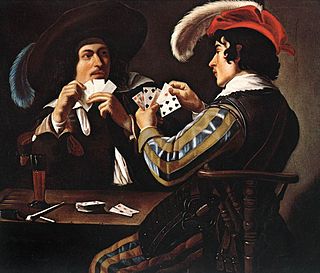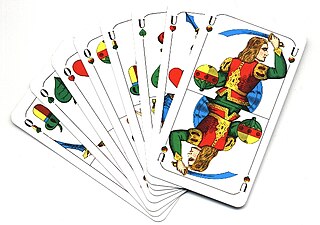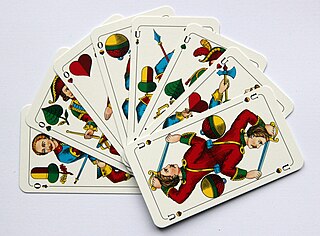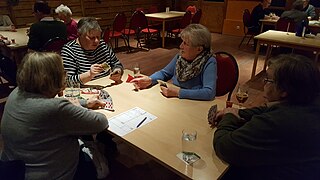Related Research Articles

A card game is any game using playing cards as the primary device with which the game is played, be they traditional or game-specific. Countless card games exist, including families of related games. A small number of card games played with traditional decks have formally standardized rules with international tournaments being held, but most are folk games whose rules may vary by region, culture, location or from circle to circle.

Sheepshead is an American trick-taking card game derived from Bavaria's national card game, Schafkopf. Sheepshead is most commonly played by five players, but variants exist to allow for two to eight players. There are also many other variants to the game rules, and many slang terms used with the game.

Skat, historically Scat, is a three-player trick-taking card game of the Ace-Ten family, devised around 1810 in Altenburg in the Duchy of Saxe-Gotha-Altenburg. It is the national game of Germany and, along with Doppelkopf, it is the most popular card game in Germany and Silesia and one of the most popular in the rest of Poland. A variant of 19th-century Skat was once popular in the US. John McLeod considers it one of the best and most interesting card games for three players, and Kelbet described it as "the king of German card games."
A Swiss-system tournament is a non-eliminating tournament format that features a fixed number of rounds of competition, but considerably fewer than for a round-robin tournament; thus each competitor does not play all the other competitors. Competitors meet one-on-one in each round and are paired using a set of rules designed to enscompetitor plays opponents with a similar running score, but does not play the same opponent more than once. The winner is the competitor with the highest aggregate points earned in all rounds. With an even number of participants, all competitors play in each round.

Schafkopf, also called Bavarian Schafkopf, is a popular German trick-taking card game of the Ace-Ten family for four players that evolved, towards the end of the 19th century, from German Schafkopf. It is still very popular in Bavaria, where it is their national card game played by around two million people, but it also played elsewhere in Germany and in Austria. It is an official cultural asset and important part of the Old Bavarian and Franconian way of life. Schafkopf is a mentally demanding pastime that is considered "the supreme discipline of Bavarian card games" and "the mother of all trump games."

Doppelkopf, sometimes abbreviated to Doko, is a trick-taking card game for four players.

Schnapsen, Schnapser or Schnapsa is a trick-taking card game of the Bézique (Ace-Ten) family that is very popular in Bavaria and in the territories of the former Austro-Hungarian Empire and has become the national card game of Austria and Hungary. Schnapsen is both of the point-trick and trick-and-draw subtypes.

The following is a glossary of terms used in card games. Besides the terms listed here, there are thousands of common and uncommon slang terms. Terms in this glossary should not be game-specific, but apply to a wide range of card games. For glossaries that relate primarily to one game or family of similar games, see Game-specific glossaries.
Schneider is a term used in many card games for a low card point score that results in boosting an opponent's game score. The threshold is usually half the total points needed for a win; below the threshold, the player or team is Schneider; above it they are 'out of Schneider'. Its natural extension is Schwarz, said of a player or team who loses the game without taking a single trick.

Tapp is a trick-taking, card game for 3 or 4 players using 36 French-suited cards that is played in the south German region of Swabia, especially in the former Kingdom of Württemberg. It is the French-suited offshoot of German Tarok; its German-suited form being called Württemberg Tarock in that region. Tapp is one of a family of similar games that include Bavarian Tarock, the Austrian games of Bauerntarock and Dobbm, and the American games of Frog and Six-Bid Solo. Although probably first played in the early nineteenth century, the game of Tapp is still a local pastime in its native Württemberg, albeit in a greatly elaborated form.
Grosstarock is an old three-handed card game of the Tarock family played with a full 78-card Tarot pack. It was probably introduced into the southern German states around 1720 but spread rapidly into Austria and northwards as far as the Netherlands and Scandinavia. It only survives today in Denmark where it is called Tarok.

Tournament Schafkopf is an organised form of the popular card game, Schafkopf, in which large numbers of players compete for prizes. Such tournaments are mainly held in countries where Schafkopf is popular such as Germany, Austria, Hungary and the Czech Republic.

Bauerchen, also Bauerchens, Bauerspiel, Bauersche or Bauersches, is a trick-taking card game of the Ace-Ten family for four players that is played in the Palatinate region of Germany, especially around the city of Kaiserslautern, as well as in south Hesse. It is often played during leisure times as an alternative to well known games such as Schafkopf or Skat. Regular Bauerchen tournaments also take place. The game is named after its four permanent trumps or "Bowers".

Fipsen or Fips is an old north German card game for 4 or 5 players that resembles British Nap in some respects. It is a trick-taking game played with a standard Skat pack that was once popular across North Germany in the former states of Schleswig, Holstein, Mecklenburg and Pomerania, but is now restricted to the south Holstein region. In the village of Thedinghausen in Lower Saxony, a rather different game is played under the same name for currant buns called Hedewigs. It has been described as "quite a special card game" that is "ancient, but very easy to learn".
Bierlachs, also Bierskat, Bierscat, Lachs or Beer Skat, is a variant of Germany's national card game, Skat, in which the winner is the first to score a fixed number of points. It is predominantly played for beer in pubs and restaurants.
Schwimmen or Einunddreißig is a social card game for two to nine players, played with a 32-card Piquet pack, that is popular in Austria and Germany. Although it is also called Einunddreißig, this should not be confused with a predecessor of Siebzehn und Vier (Twenty-One), also called Einunddreißig. Schwimmen is German for "swimming" which refers to the last chance that a player gets before they drop out.
Herzblatt or Herzblättchen is a German card game of the Ace-Ten family for two to five players. It bears a certain resemblance to the extinct 19th-century game of Piquesept, however without the special rules associated with the trump Seven.

Dreierles is a three-handed, trick-taking Tarot card game that is popular in the German region of central Baden. It is very old and appears to be a south German cousin of Tapp Tarock, the oldest known 54-card Tarot game. Dreierles is played with Cego cards - the only surviving German Tarot cards still produced. German soldiers fighting with Napoleon almost certainly introduced a Spanish modification to Dreierles that produced Baden's national game of Cego. Its relative simplicity makes it a good introduction to games of the central European Tarot family, usually called Tarock games.

Sjavs is a Danish card game of the Schafkopf family that is played in two main variants. In Denmark, it is a 3-player game, played with a shortened pack of 20 cards; in the Faroe Islands, where it is very popular, it is a four-hand, partnership game using a standard Piquet pack of 32 cards.
Skat scoring refers to the method of recording of game points in the card game of Skat. Since it is normal for a number of rounds to be played, not just a single game, there is a need to record and account for the game points won by each individual in order to determine the overall result. A proper scoring system is especially important for the Tournament Skat and Skat played for small stakes.